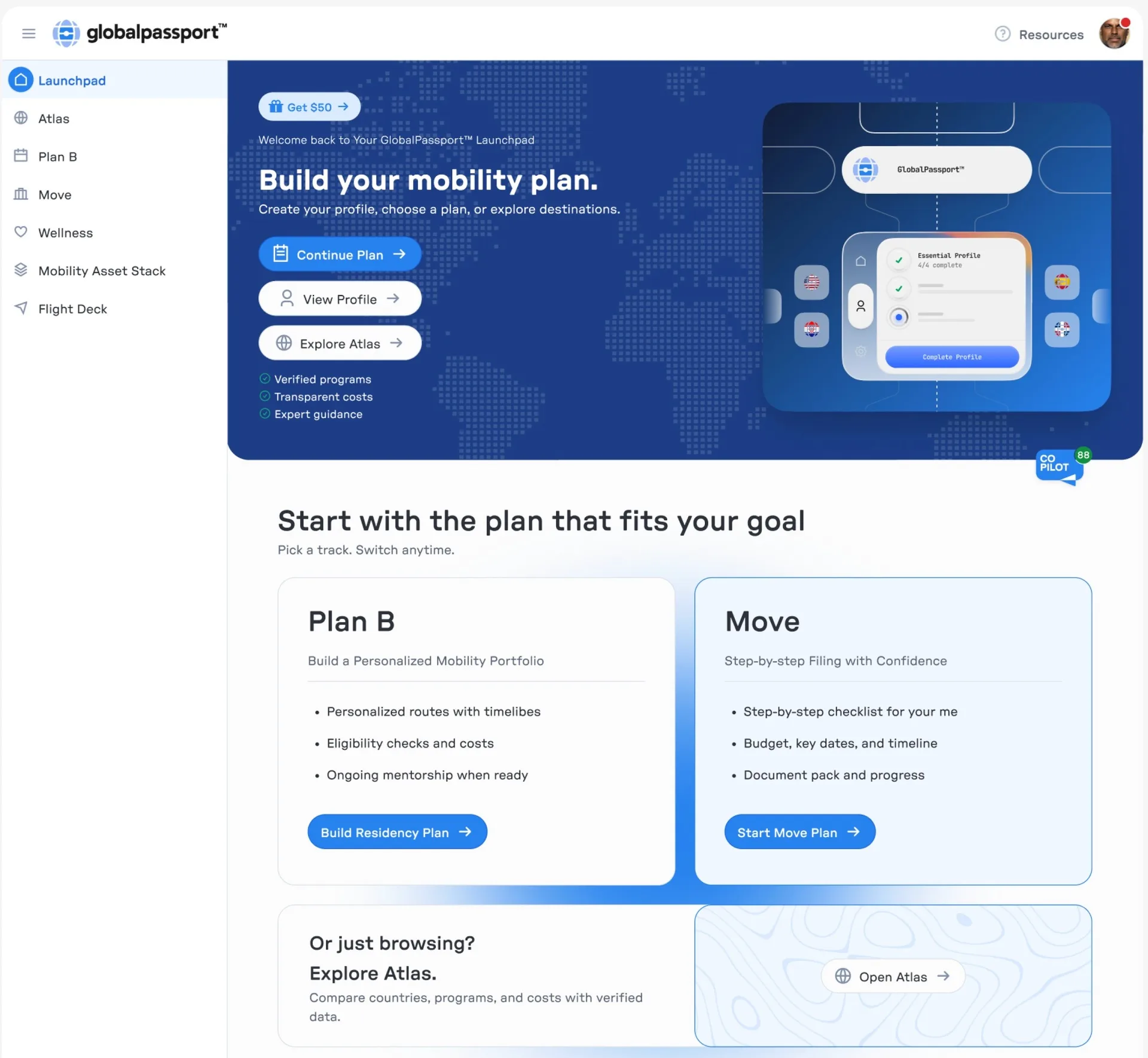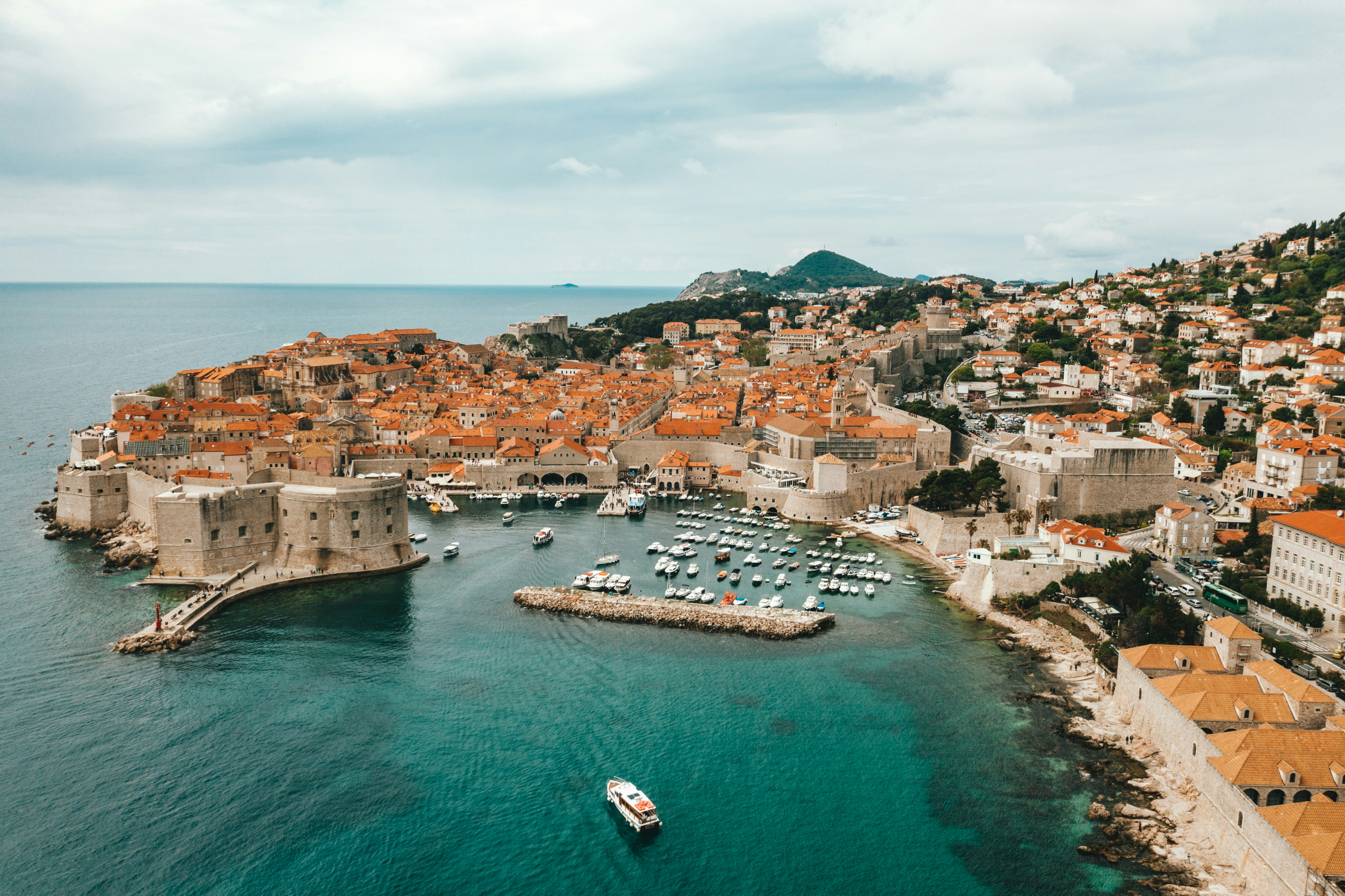Quick Summary
Croatia’s Digital Nomad Residence Permit allows non-EU citizens to live in the country for up to one year while working remotely for foreign employers. You must earn about €2,500 per month, show proof of accommodation and insurance, and avoid local employment. GlobalPassport’s Plan B and Atlas tools help simplify your path, budget, and renewal planning.

Overview
Croatia launched its Digital Nomad Residence Permit in 2021 under amendments to the Aliens Act to attract remote workers and entrepreneurs. It offers a 12-month residence permit (non-renewable consecutively) with tax exemptions on foreign income, making it one of Europe’s most lifestyle-friendly and compliant destinations for remote professionals.
This guide explains eligibility, documentation, application steps, processing times, and how GlobalPassport can help you use Croatia as part of a broader residency portfolio for EU access and tax flexibility.
Compliance note: Always confirm details with the Ministry of Interior (MUP) and a licensed immigration or tax advisor before applying.
The Quick Take
Who it’s for: Remote employees, freelancers, and digital entrepreneurs with foreign income.
Stay length: Up to 12 months (non-renewable back-to-back).
Income test: At least HRK 17,822 per month (~€2,500) or HRK 213,870 (~€28,000) per year.
Tax basics: No local income tax on foreign-sourced earnings.
Restricted work: You cannot provide services to Croatian entities or clients.
✅ Eligibility & Required Documents
Core Criteria
- Valid passport (minimum 3 months beyond intended stay).
- Proof of remote work or ownership of a foreign company.
- Income verification:
- Bank statements showing regular deposits, or
- Employment/freelance contract confirming monthly income.
- Health insurance valid in Croatia for the entire stay.
- Background check (criminal record certificate, apostilled).
- Proof of accommodation (lease agreement, booking confirmation, or ownership document).
- Copy of passport bio page.
- Completed application form (available via MUP Portal).
Optional or Situational Documents
- Proof of marriage or family relationship (if applying with dependents).
- Bank certificate confirming sufficient funds.
Dependents: Spouse and children can join if you meet a higher combined income threshold (~HRK 26,700/month).
🧾 How to Apply
- Collect and prepare documents → translations into Croatian if needed; apostille for foreign certificates.
- Submit online via the MUP e-Service Portal or at the local police administration office if already in Croatia.
- Wait for approval (average 4–8 weeks).
- Register your address within 3 days of arrival.
- Submit biometric data for your residence permit card.
- Pick up your card at the same police office once approved.
Processing Time: Typically 4–8 weeks depending on workload and completeness.
💰 Costs & Fees
Applicants who file in Croatia may also pay a small administrative tax (~€5–10) for address registration.
📊 Taxation & Compliance
Croatia’s DNV holders are not considered tax residents unless they spend more than 183 days in the country and have Croatian-sourced income.
Foreign-sourced income (salary, freelance, dividends) remains tax-exempt under the Aliens Act provision for digital nomads.
For further clarification, consult the Tax Administration of Croatia or your GlobalPassport Advisor.
🧩 How GlobalPassport Helps
Plan B → Residency Portfolio
Build your regional hedge using Croatia as your EU base:
- Combine with Portugal DNV for EU mobility.
- Add Georgia or Panama as tax-friendly jurisdictions.
- Track renewal windows and travel days through Plan’s built-in dashboard.
Inside Plan:
- Visualize timelines and overlapping activation periods.
- Set alerts for re-entry eligibility after 6-month cooldown.
- Compare healthcare, rent, and residency privileges by country.
Atlas → Country Report Card (Croatia)
Evaluate if Croatia fits your lifestyle goals:
- Compare cost of living (Zagreb vs. Split vs. Dubrovnik).
- Review broadband speed, visa processing reliability, and safety metrics.
- See real-time updates on income requirements (HRK → EUR parity).
- Understand pros & cons: lifestyle quality vs. short permit duration.
Mobility Lab → Personal Runway Calculator
Estimate your mobility runway and budget in real terms:
- Input monthly income and expected rent in HRK or EUR.
- Output: months of savings buffer and breakeven points.
- Add stress tests for variable expenses (travel, healthcare, dependents).
⚠️ Common Friction Points
- Applications missing apostilled criminal record are rejected.
- Documents not in Croatian require official translation.
- You cannot renew consecutively; must exit for 6 months before reapplying.
- Some applicants confuse this visa with a “work permit” (it is not).
- Health insurance must explicitly state “valid for Croatia.”
📅 Example Timeline
💡 Get This Done with GlobalPassport
- Run Mobility Profile → confirm monthly income threshold (≥ HRK 17,822).
- Open Croatia Country Report Card in Atlas → review lifestyle, safety, and rent metrics.
- Build your Plan B Portfolio → add Croatia + 2 secondary residencies.
- Use Runway Calculator → estimate 12-month budget and renewal options.
- Book a GlobalPassport Advisor → ensure compliance with MUP and tax regulations.
Join GlobalPassport for free to compare digital nomad programs and design your global residency stack.
🔗 Official Sources
- Ministry of Interior (MUP)
- Digital Nomad Visa Croatia Portal
- Tax Administration of Croatia
- Croatia Digital Nomad Association
- eVisitor Croatia

FAQs










Conclusion
.webp)
Interested?
Dive into the American Diaspora White Paper downloadable document now.
download WHITE PAPER
Need Help With your Application?
sign up for globalpassport
Design your mobility-asset plan
GlobalPassport Passportfolios curate ready-to-execute sets of programs that fit your goals and risk profile. Start with Graduate Magnets to spot post-study pathways and early-career routes in talent-friendly countries.
Explore Passportfolios


































.svg)
.svg)

